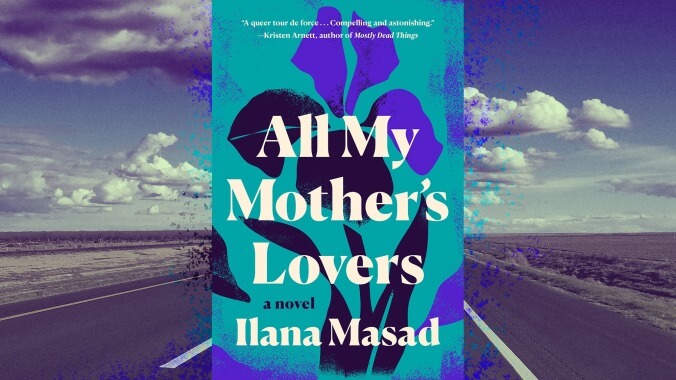A woman takes a road trip into the past in the complex family portrait All My Mother’s Lovers

Throughout her life, Maggie Krause, the protagonist of Ilana Masad’s ambitious, cinematic debut novel, All My Mother’s Lovers, has been shaped by her mother, Iris, despite her best efforts to resist. Like her mother, Maggie has a hard time with commitment, in part tied back to Iris’ absences during long work trips throughout her daughter’s childhood. That Maggie lives with her current girlfriend, Lucia, suggests that she is, for once, trying to love a confident, stable woman.
When Iris dies in a car crash, Maggie travels from her home in Missouri to Oxnard, California, to be with her devastated father, Peter, and teenage brother, Ariel. From there, the narrative moves back and forth in time. Immediately after the crash, we get Iris’ narration of her last day alive, including her visit to an assisted living facility to hook up with one of her lovers. Sprinkled throughout the book are Iris’ accounts of her extramarital relationships, from the 1970s through the aughts. Foreshadowing them as a secret life that Iris has kept from her children is important in All My Mother’s Lovers, as she has requested in her will that five sealed letters be delivered to a series of men. (Though it strains belief—both Maggie’s and likely the reader’s, as well—that Iris would write final missives to all these men, but not her husband of 30 years.) Even after Iris’ death, Maggie defies her mother’s wishes to have Peter just drop them in the mail and volunteers to hand-deliver them herself.
So off Maggie goes, on the road from Oxnard to Las Vegas and Northern California to solve this mystery that forces her to confront her uncomfortable feelings about her mother. She ruminates over the mysterious letters, and the people who will receive them, but she is most neurotic about why her relationship with her mother wasn’t as solid as her mother’s relationship with her straight brother.
Even though we learn that Maggie has shown a lot of the same indiscretions and flaws as her mother—she’s restless, she’s a distant partner who is afraid of commitment—we don’t get a firm sense of Iris’ identity. She’s portrayed, even in chapters written from her point of view, as a cloying narcissist or an aloof, detached woman with an excessive focus on sex. Maggie herself is self-conscious and judgmental—a daughter who nurses the wounds of her mother’s rejection alongside the fresh grief of loss.
Throughout much of the novel, Maggie wrangles over her infidelity with former partners and considers cheating on Lucia—so much so that the scenes where she is driving or stopping for food, texting her girlfriend or calling Ariel, who is growing up fast and trying to have sex with his new girlfriend, sometimes overshadow her mission to find out more about her mother. The result is a lot of time spent in the past.
While Maggie’s decision to hand-deliver these letters is a cool conceit, there are times when the language, even in epistolary form, is a little wooden or technical. Here is Maggie reflecting on why she hates Vegas: “Yes, she thinks, this is the thing about Vegas that she doesn’t like: as fun as it can be it reeks of performative straightness at every turn.” Still, it is a nice change of pace for a book to center on the desire of an older woman like Iris, who is wanted based on her looks, but also ineffable qualities tied to her personhood.
Early on we learn that Iris has bequeathed her lucky amber necklace to Maggie, but both her engagement and wedding rings to Ariel. Lucia wisely asks Maggie if that means that Iris has left Ariel the future and Maggie the past. Well, neither. Iris created an amendment to her will that will give Maggie both the ring and the necklace, and Maggie concedes with the codicil that she was given, ultimately, a little bit of both the present and the past—a generosity she can live with.
For all her faults, by the novel’s end, Maggie is easier to understand as representative of the kinds of reckonings and rituals that save so many queer people when their families seem to desert them. All My Mother’s Lovers is an intimate, complex family portrait that follows the messy life of one queer woman who comes to understand that all relationships are untidy; that’s part of what makes them memorable.